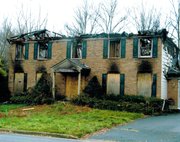Potomac — The simple act of placing a spoon in a sink made all the difference for the Bies family one spring night in Potomac over nine years ago. That was the night Susan Bies decided to walk up from the basement family room where she and her husband had been relaxing to put a spoon she had been using into the kitchen sink.
On Monday, April 19, 2004, at approximately 10:30 pm, her house burned to the ground.
When Bies entered the kitchen on that particularly warm night, she remembers noting that it seemed especially bright outdoors. Crackling sounds, a noise she had never heard before in her home, seemed to be coming from within the walls. It took her a few short moments to grasp that her entire back porch and deck were on fire.
“By instinct I realized that my son’s room lay above this exact area of the house,” she said. “I raced up the stairs. By the time I got there his window was engulfed in flames. It hadn’t penetrated the glass yet, but the entire window was lit up and he was sleeping completely unaware.”
Bies shrieked at her son to get out of the house, literally grabbing him and throwing him out of bed. As he scrambled down the stairs, she realized her daughter was across the hall, also still asleep. As she raced towards her room, her daughter stumbled out of bed. Her husband, unaware of the situation rapidly unfolding, was still in the basement. So she ran to get him too.
“Once I got the kids outside I hurried to call 911 and realized I couldn’t go to the kitchen because it was already engulfed in flames,” she remembered. “If I’d gone to the office to use the other phone, I would have been trapped. And I couldn’t find my cell phone.”
With everyone assembled on the lawn, Bies ran to the neighbor’s to get help. She looked back at her home in time to see flames exploding from the windows. So sudden and intense was the blaze that neighbors later likened the fire to Dante’s Inferno. It took all night long for the flames to be controlled. By morning, there was nothing left.
Watching her house burn, it seemed like forever until the fire company came.
“When the firemen arrived, they immediately set about protecting our neighbors’ houses. I didn’t understand why at the time, but they obviously knew our house would be a total loss,” she said.
PEOPLE OFTEN ASK Bies about the smoke alarms. She emphasizes that what happened that night occurred outside of their home. They were having renovation work done. Workers had just sanded the deck that spanned the entire back of the house. They’d tied the used-up deck sealer, dirty rags, lunch trash and sawdust in plastic bags and laid it all on top of the leftover cans of sealant.
The cans of sealant, clearly marked “Combustible,” coupled with the rags being tied up, plus the unusually warm night, caused the whole pile to spontaneously ignite. The deck and porch, still wet from the sealant, were instantly engulfed. From there, it was only a matter of minutes until the whole back of the house burst into flames.
The Bies know this to be true because the inspector who came that night and investigated the premises wasted no time in concluding that the debris and combustible cans were the clear cause of the fire.
Though the American Red Cross promptly arrived on the scene to offer them shelter, for Bies, one of the hardest parts was realizing her family was suddenly homeless. She is forever grateful to the neighbors who took them in: “Our neighbor came to me and said ‘I’ve cleared out the guest room and you’ll be staying with us.’” The family stayed with their neighbors for about a month until they moved into a rental home.
The day following the fire, both Bies children insisted on going to school. They wore borrowed clothes. Bies remembers her daughter being concerned that she was ‘out of uniform.’ “I still shake my head when I think of that,” she said.
In addition to their home, the Bies family lost a new car and all their personal papers, including all sources of identity. The next day, still reeking of smoke, they walked to PNC Bank, their local bank, whose employees thankfully knew them. Through the bank, they were able to access their accounts. Their neighbor drove Bies and her husband to the MVA to get new licenses. The Bies later borrowed a car. The same neighbor gave them all shoes.
“It’s amazing the things you take for granted,” she said.
THOUGH THE FAMILY has long since rebuilt, parts of the experience, to this day, are residual. Any crackling or unusual sound in the home sends Bies into a tailspin.
“Sometime after we had finally moved into our new home, which had been entirely rebuilt, my daughter called to me that there was a crackling noise coming from somewhere in her room. I felt my fear well up inside of me. There was a distinct crackling sound coming from somewhere within the space. Could this be happening again? We frantically searched the room until we found a closet mirror that was slowly coming apart from its Velcro mounting. The sound never leaves you,” she added.
How to make sense of her experience? Bies has tried to look on the positive side. After over a year spent trying to document her home’s belongings, mostly by memory, she ended up compiling a short how-to guide titled “Some ‘Peace of Mind’ Advice; Before Something Bad Happens.”
The short guide provides information on how to prepare for something bad by becoming educated and organized about one’s home and personal possessions. These are simple things you can do now, and according to Bies, “You won’t be sorry you invested the time. You’ll be the better for it.” Following are some highlights.
Five things to do now to safeguard one’s home and belongings:
- Review the Home Owners’ Insurance Policy and be comfortable with it.
Be clear what is included/excluded in the $/square foot rates. Does your coverage include your basement, attic, porches and decks? Make sure you are adequately covered. Know the distinction between ‘Replacement Value’ and ‘Guaranteed Replacement Value.’ It makes a difference.
Bies stresses that knowing your insurance policy is only part of the game. She cautions that not all insurance companies are on your side. “Don’t assume an insurance carrier is going to educate you or sell you the policy you need,” she said. “The mistake is that people don’t think anything will ever happen, so they price shop. Many agents will shave corners in order to give you a cheap estimate. Don’t be afraid to brief yourself on your policy. If you knew your house was going to burn down tomorrow, you can be sure you’d read every page of it.”
- Have a family exit plan and rehearse it.
Fire is fast and violent. Practice an exit plan. Children are used to drills.
- Document your belongings.
Within reason, try to document your belongings. Fill a CD with digital photos, put them on a hard drive and store it in your safe deposit box.
Says Bies, “I spent a good year trying to remember everything in our house. In our case it was a total loss so there was very little if anything to physically evaluate. I had to remember what we owned, room-by-room, drawer-by-drawer, to rebuild it in my mind. I scoured photographs of my family for what was in the background and what we were wearing.”
- Keep documents in a safe place.
Confirm that you have blueprints/house feature information on file and in a safe place. Make copies of all important identification materials including passport, birth certificate, drivers license, and insurance policies.
- Before considering a home construction project, look before you leap.
Ask your builder what insurance coverage he carries and what safety procedures he has in place to protect you, particularly where it concerns sub-contractors.
It turned out that the day the demolition crew came to knock down her home was her son’s birthday. As she watched the wrecking ball swing repeatedly against the charred- brick remains, Bies was using her neighbor’s kitchen to bake his cake.
Life goes on.
For more tips on how to protect one’s home and belongings, or for a copy of her “Peace of Mind Advice,” contact Bies at Bies87@aol.com.

